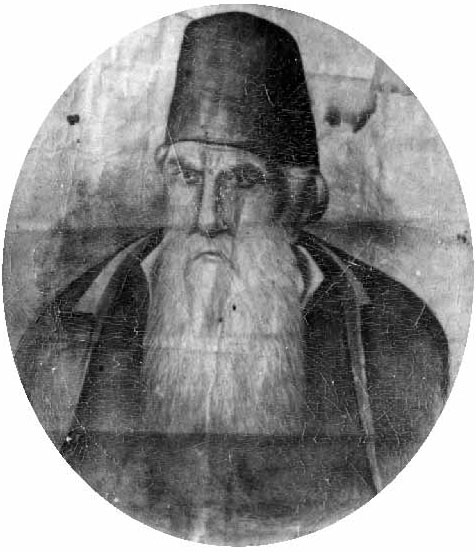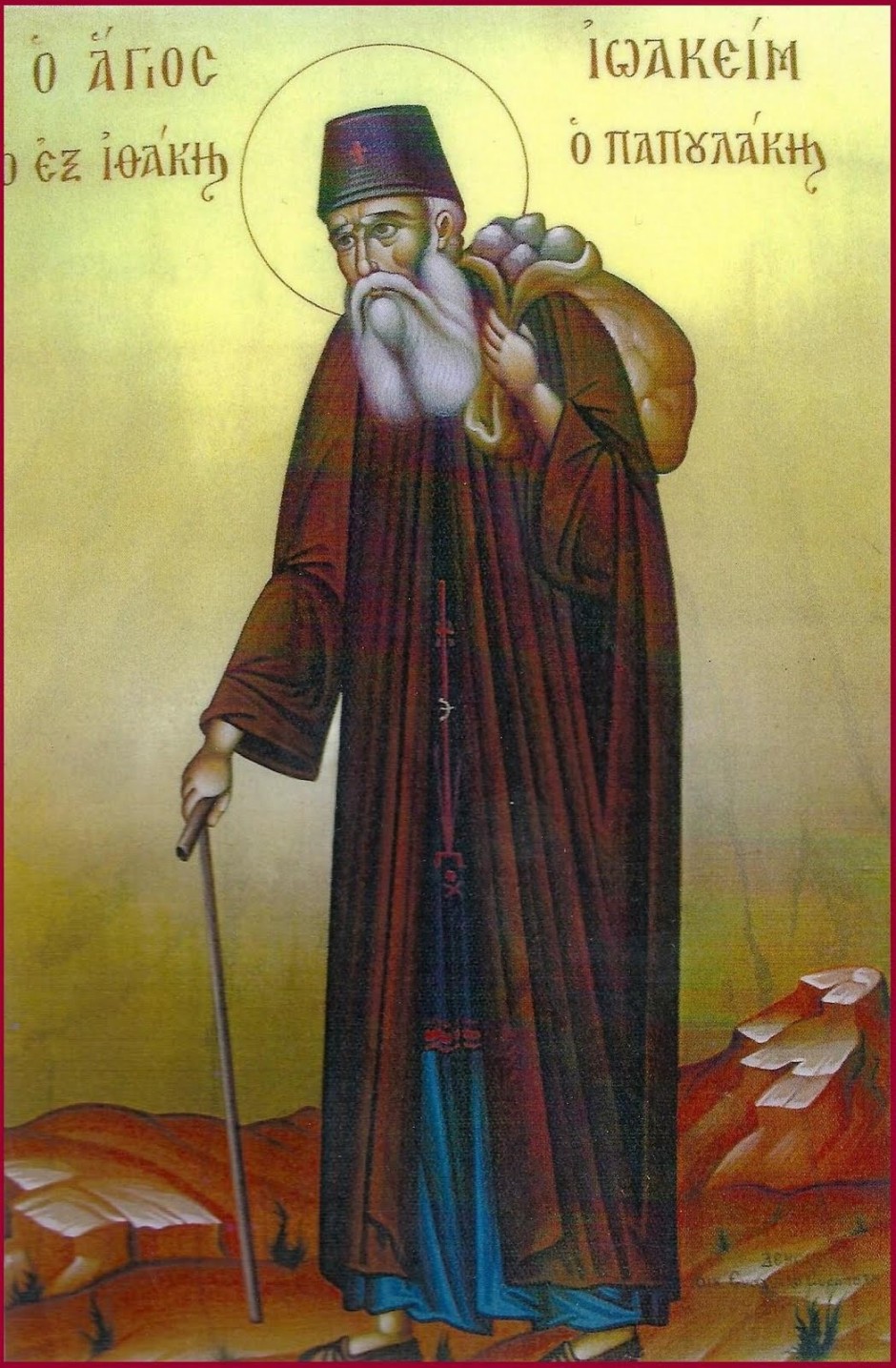Elder Joseph οf Vatopaidi: Papoulakis, Saint Joachim of Vatopaidi (part i)
12 Οκτωβρίου 2019
PROLOGUE
While exploring the inexhaustible library of our Monastery, a book printed in 1902 fell quite unexpectedly into our hands. It bore the title The Life and Acts of our Blessed Father Joachim of Ithaki and was written by a physician from Ithaki named Panos D. Raftopoulos.
Looking over this book, we realized that it was about the life of a contemporary holy man -one unknown to us- who had reposed in 1868. But what is significant and deserving of our attention is that blessed Joachim was a brother of our Holy Monastery of Vatopaidi. The discovery of this spiritual treasure was a source of great joy and of spiritual exaltation for our entire brotherhood. Precisely during that period we had begun to examine in detail the Monastery’s archives in an attempt to discover all of the Vatopaidi saints and to publish, with God’s help, the “Vatopaidi Meadow”, presenting the spiritual blossoms of the Monastery. Thus far blessed Joachim is the forty-third Vatopaidi saint.
The inspiring life of Saint Joachim, “Papoulakis” — “Little Grandfather,” as he was called by the Ithacans — is a clear proof that, even in these difficult days of ours, holy Athos continues to give the world the “good witness of Jesus Christ” (see Rev. 20:4).
The Vatopaidi monk Joachim lived at the Monastery for about twenty years. Seeing the spiritual need of the Greek nation, and being convinced of Joachim’s holiness, the Mon-astery sent him out for the solidarity of the people of God, who were wearied and wounded by the Turkish domination. Blessed Joachim forsook his beloved monastery in an act of obedience and traveled about cities and villages as a true missionary — like a second Cosmas Aitolos — teaching and instructing the people.
From his biography, it appears that Saint Joachim was filled with grace while still in his mother’s womb. In this, and in all his life, one sees “wonders and signs” (Acts 2:43), just as we also encounter in all those who have been “pleasing to God throughout the age” (from the Liturgy of Saint John Chrysostom).
Not wanting the “lamp” to remain “under the bushel basket” (Mk. 4:21), we immediately met with the Very Reverend Metropolitan of Levkas and Ithaki, Bishop Nikiphoros, to discuss the subject. His Grace received us with genuine fatherly love and likewise showed a fitting interest in blessed Joachim, who had remained hidden until now.
Together with His Grace, we went over to Ithaki to draw near to and venerate the Saint’s tomb, which was located in the community of Stavros in Ithaki, behind the holy sanctuary of the church of Saint Barbara, which the Saint himself had built.
What was moving for us as we wandered about the island was to see that large photographic copies of the Saint’s image were found on almost all of the icon screens of the churches, as well as in many homes of the Ithacans, and that he was being honored as a saint. As we spoke with many Ithacans, we saw that even today blessed Joachim attends to and works with the yearnings of the faithful, interceding for all as a fit guardian angel, granting illumination, and speaking to simple hearts. Devout believers have testified that they feel his presence among them.
By all accounts it seems that blessed Joachim was a great hesychast**, because, whenever he found the opportunity, he would withdraw “into the wilderness” (Lk. 5:16), where he would pray “without ceasing” (1 Thes. 5:17). The Saint, as a laborer who readily embraced hardship, “kept the difficult ways” (Ps. 16:4 LXX) as a means of ascetic struggle, walking in the “narrow and difficult way” (see Matt. 7:14). Many Ithacans saw him treat his body with severity and, many times, without apparent reason, load himself up with rocks, the sole purpose being to undergo hardship and asceticism. In this way, in conjunction with grace, he acquired the divine charismata [i.e., gifts] of wonderworking and of victory over the evil one. As we shall see, the Saint was especially blessed with the gifts of clairvoyance** and prophecy. The pious Ithacans related innumerable accounts to us that clearly reveal these spiritual gifts of the Saint.
Our Holy Monastery considers it a special blessing that our venerable Elder, the monk Joseph, took on the writing of this book, because we know that a saint’s grace-filled inner world, filled with the riches of the sanctifying grace of the Holy Spirit, can only be understood by someone who has a “comparable life” and common life experiences. For exactly this reason, our venerable Elder, aware of the prerequisites for a person to undertake the writing of such a book, states in his epilogue that he “fears that perhaps what he has writ¬ten has slighted such a hero of God’s love.”
In addition, the reader of this book should bear in mind that our Elder had never received even a rudimentary educa¬tion. He attended only the first years of primary school. Consequently, this book has not been written according to literary rules of composition. In spite of these things, we are convinced that with his more than fifty years of monastic experience on the Holy Mountain, and especially with his many years as a disciple at the feet of his elder, Joseph the Hesychast, he has written about and commented on the amazing life of blessed Joachim of Vatopaidi, from Ithaki, in a completely patristic manner.
With all these things in mind, we feel the pressing need, as we proceed with this second edition, to make this Vatopaidi saint all the more known as a contemporary manifestation of the Holy Spirit in today’s materialistically minded world, especially following his official enrollment by the Mother Church into the catalog of saints of the Orthodox Church. Thus, once again, we have clear proof that “Jesus Christ is the same yesterday, today, and forever” (Heb. 13:8).
We owe a great debt of gratitude to the Very Reverend Metropolitan of Levkas and Ithaki, Bishop Nikiphoros who demonstrated his concern for the Saint by making it possible for his relics to be exhumed in 1992. Consequently, our Church has been enriched by the presence of his divinely blessed relics.
We also owe thanks to all those who assisted in the gathering of material about the life and the miracles of the Saint, as well as to those who helped with the unearthing of his grace-flowing relics, especially to the reverend Father Theodosios Dendrinos and to the pious teacher, Mr. Konstantinos Kanellos.
The recent official enrollment of Saint Joachim into the Calendar of Saints of the Orthodox Church by the august Ecumenical Patriarchate — which we filially thank for its part in bringing us this great joy — has also contributed to the furthering of the awareness of his supernatural struggles.
We humbly pray that this second edition of Saint Joachim’s life will contribute to the rekindling of the devout readers’ yearning for God.
The Abbot of the Holy Great
Monastery of Vatopaidi
Arcimandrite Ephraim
to be continued…





